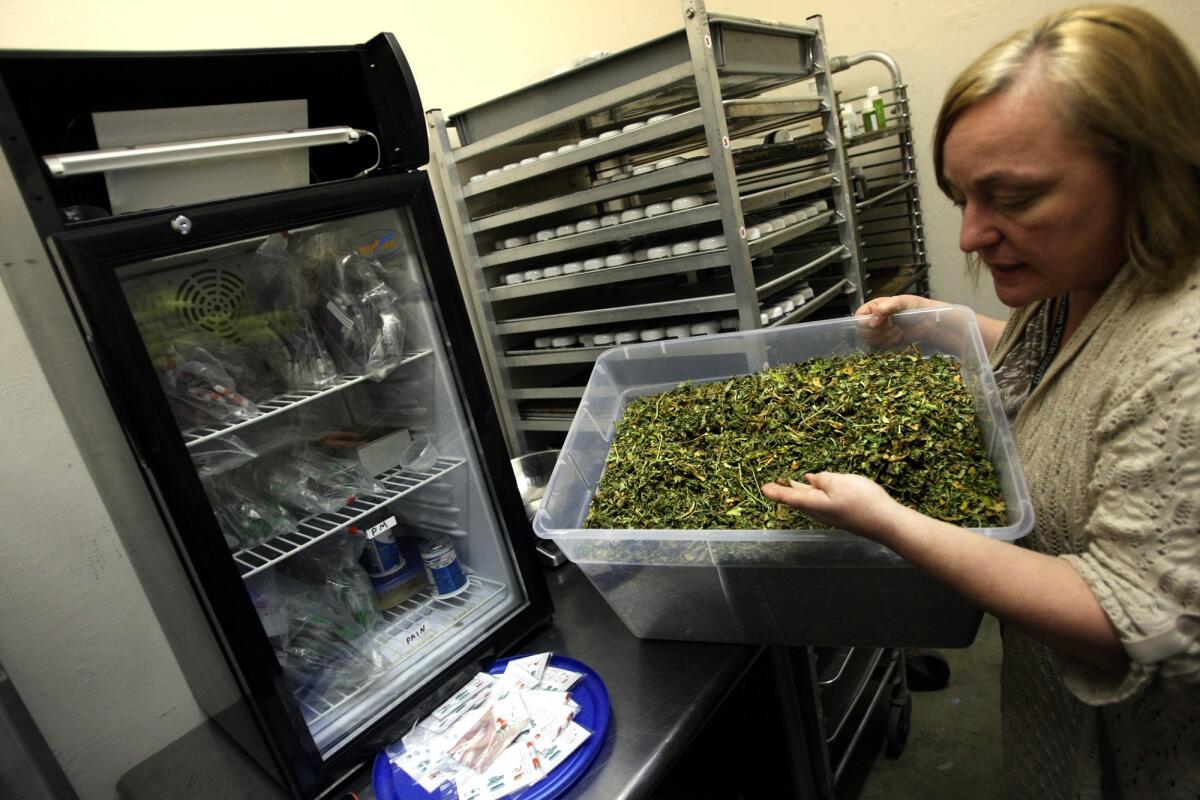Colorado, Washington square off with Oklahoma, Nebraska over pot law

Christie Lunsford of Dixie Elixirs & Edibles in Denver holds a container of marijuana trim that is used to infuse products sold there.
The top law enforcement officials in Colorado and Washington are urging the U.S. Supreme Court to reject a lawsuit from states that seek to strike down Colorado laws that legalize recreational marijuana use.
Oklahoma and Nebraska filed their suit directly with the Supreme Court, arguing that Colorado’s move to legalize marijuana conflicts with federal drug regulations.
The Oklahoma and Nebraska attorneys general contend that easy access to marijuana has led to a surge in trafficking, with residents crossing into Colorado to purchase pot legally and sell it -- illicitly -- at home in Nebraska or Oklahoma. Kansas has also considered joining the suit.
In a 49-page brief filed Friday, Colorado Atty. Gen. Cynthia Coffman urged the nation’s highest court to throw out the suit.
“My office remains committed to defending Colorado’s law,” Coffman said in a statement. “At the same time, I share our border states’ concerns regarding illegal marijuana activity, and my office, as well as our partner state and local law enforcement agencies, are committed to stopping marijuana diversion. This lawsuit, however, even if successful, won’t fix America’s national drug policy.”
In 2012 voters in Colorado and Washington approved measures to legalize marijuana use. Colorado’s law allows for the sale and possession of up to an ounce of marijuana for recreational use for anyone 21 and over with a valid driver’s license.
Washington Atty. Gen. Bob Ferguson filed a friend-of-the-court brief Friday asking the high court to dump Nebraska and Oklahoma’s lawsuit, suggesting that it could also threaten laws in his state.
“I am disappointed that Nebraska and Oklahoma took this step to interfere with Colorado’s popularly enacted initiative to legalize marijuana,” he said in a statement. “I filed this brief to protect Washington’s interests and the will of Washington’s voters from interference by other states.”
In their briefs, both Coffman and Ferguson argued that the Supreme Court should adhere to its long-standing policy of not settling policy disputes between the states.
Citing as evidence of the lawsuit’s merits, Aaron Cooper, a spokesman for Oklahoma Atty. Gen. Scott Pruitt, pointed to the recent take-down of an interstate drug ring that was trafficking medical marijuana from Colorado to other states.
“This week Colorado announced its largest marijuana bust since legalization -- a single criminal operation responsible for trafficking $12 million in illegal medical marijuana out of Colorado and into other states. Oklahoma is not challenging Colorado’s decision to legalize marijuana for personal use or possession under Colorado state law,” Cooper said. “The only portion of the Colorado law Oklahoma is challenging is the section that transformed Colorado into a large-scale hub for the commercial growing and selling of marijuana.”
A spokeswoman for Nebraska Atty. Gen. Doug Peterson said his office was reviewing Colorado’s filing but declined to comment further.
The legal challenge filed by Colorado’s border states has been scoffed at by experts, and conservatives have even stepped forward to criticize the suits filed by two heavily Republican states.
In January, a number of GOP legislators in Oklahoma asked Pruitt to drop the suit because it infringed on states’ rights to pass their own laws.
Georgetown University law professor Randy Barnett, who has argued a marijuana case before the Supreme Court, previously told the Los Angeles Times that Oklahoma and Nebraska had no basis for the suit.
“This is a very weak claim. Their real beef is with the federal government for not enforcing the federal drug laws,” he said. “It is not up to the states to sue each other when the federal government is not enforcing the law.”
Times staff writer Kurtis Lee contributed to this report.
Follow @JamesQueallyLAT for breaking news
More to Read
Sign up for Essential California
The most important California stories and recommendations in your inbox every morning.
You may occasionally receive promotional content from the Los Angeles Times.











